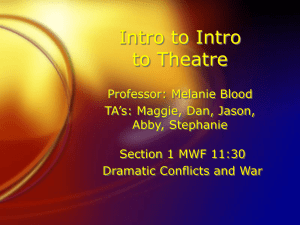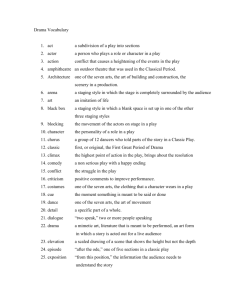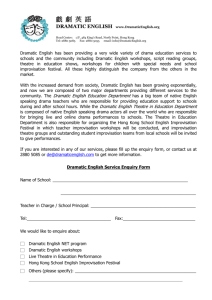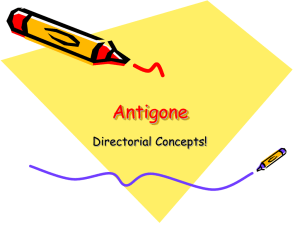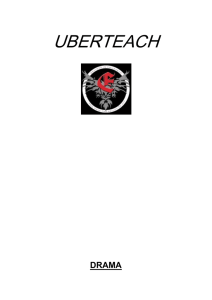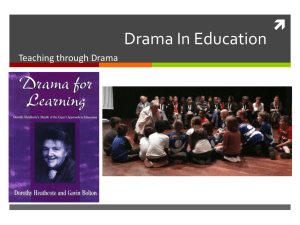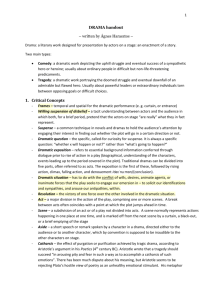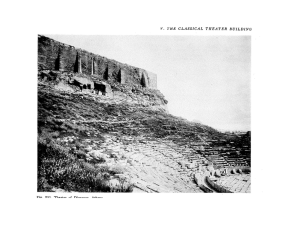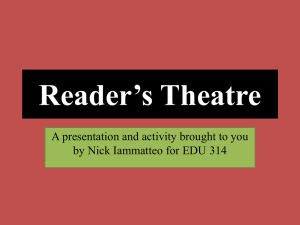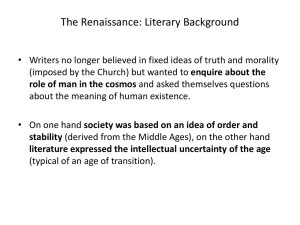Theatre and Literacy
advertisement
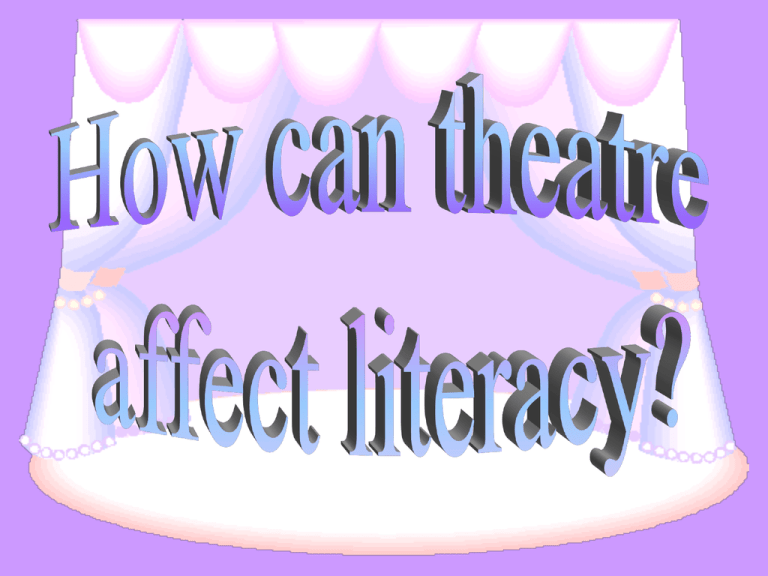
How Theatre and Drama Affect Literacy Theatre and drama activities can help improve: •Reading skills •Narrative competence •Vocabulary •Writing skills Reading Skills • Dramatic activities, such as readers’ theatre, provide repeated reading practice. • Repeated reading practice improves students’ confidence in, and enthusiasm for reading. Reading Skills Activity Readers’ Theatre Scripts • Readers’ theatre is a dramatic art form in which the script is read (not memorized) as it is performed. • This activity allows kids to bring the written word to life. • There are many, many sources for these types of scripts. • Any storybook or student written piece can also be performed as a readers’ theatre script. Narrative Competence • Dramatic activities provide a sense of story structure, not only through writing, but also by performing what the students create. • Dramatic activities can increase curiosity about literature before independent reading begins. Narrative Activities • To promote spontaneous, child-initiated and child-directed Dramatic Story Reenactments (DSR): – Use repeated readings. – Use predictable stories. – Utilize intense response activities. • Have older students come and perform DSR for your class. • Create a comfortable classroom library. Vocabulary Drama and theatre offer exciting ways to introduce new vocabulary words. The Number 1 Rule: • Create a “memorable event” when introducing new vocabulary to your students. Vocabulary Activity Here is an example of an activity that creates a “memorable event.” • Teacher: OK, it’s time to do some work. Take your cat, rock your desk, and start to write about the trees on the ceiling. • Class: Huh? What? etc. • Teacher continues this until all are paying attention. • Teacher: I’m sorry. I’m being incoherent. So, what do you think incoherent means? Writing Skills • Dramatic activities allow kids to explore the boundaries between reader/writer and character/actor. • Dramatic activities create sophisticated text and image relationships, thus assisting developing writers. Writing Skills Activities • View story from characters’ perspectives – Put kids into roles – Ask them questions, in character, about “themselves.” – Allow them to develop new characters for the story, and expand on these. – Have kids write a response to a thought provoking question about the text. • Create tableaux (still images) of subject matter. – After creating the images, have kids write from their tableau character’s perspective, about their experience. • Create original, student written scripts. Helpful Websites • www.teachingarts.org A fabulous, in-depth resource website. This site provides a multitude of information for all of the arts, focusing heavily on standards/assessment and professional development. This link takes you to the listing of resources for theatre and literacy. • www.sceaonline.com (Southeast Center for Education in the Arts) Nearly anything and everything you would want to know about using drama in education can be found on this site. It provides everything from research on the subject to activity ideas. Everyone should check this site out! • www.edreform.net This site focuses on literacy and is a resource for teachers to find ideas on how to integrate drama into their classrooms. The site provides links to various resources on the web. • http://www.lacnyc.org/publications/September98/house16.htm This is the home of the Literacy Assistance Center. This site provides a listing of books that can help teachers implement and guide dramatic activities in their classrooms. It is the LAC's belief that theater, or theater activities in the classroom, can facilitate a transformative process for students, whether they are in pursuit of English skills, a better job or heightened awareness of the world in which they live. Other Resources • http://www.literacyconnections.com/ReadersTheater.html This website has a wonderful list of helpful books, focusing mainly on readers’ theatre issues. • Structuring Drama Work, by Jonothan Neelands and Tony Goode A wonderful book of theatre games, ranging from the very simple to the complex. THANK YOU! HAPPY DRAMATIZING!

